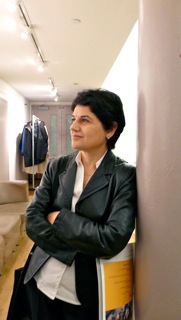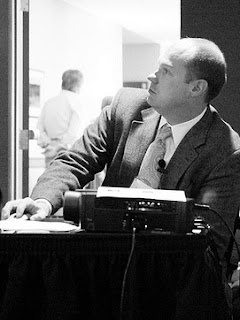Spring 2012 Digital Humanities Programs at Fordham
Fordham’s Digital Humanities Working Group is pleased to announce three campus events that feature speakers from across the country who are advancing thinking on new modes of pedagogy, working with new digital tools, and forging the links between theory and practice in the digital humanities.
 Linking Networks of People with Networks of Information: the Linked Jazz Project, a talk by Cristina Pattuelli (Pratt Institute, School of Information and Library Science) on Linked Jazz, a project mapping jazz networks using semantic web protocols will be on Wednesday, April 11th at noon in Dealy Hall, Room 304 on Fordham University’s Rose Hill campus.
Linking Networks of People with Networks of Information: the Linked Jazz Project, a talk by Cristina Pattuelli (Pratt Institute, School of Information and Library Science) on Linked Jazz, a project mapping jazz networks using semantic web protocols will be on Wednesday, April 11th at noon in Dealy Hall, Room 304 on Fordham University’s Rose Hill campus.  |
| Cristina Pattuelli Principal Investigator for Linked Jazz |
This program is sponsored by the Digital Humanities Working Group with support from the Arts and Sciences Deans of Fordham University, and co-sponsored by the American Studies Program. It is free and open to the public.
 |
| Debates in the Digital Humanities, edited by Matthew K. Gold, was published in January by the University of Minnesota Press. |
Join us in a discussion of recent debates in the digital humanities. This event celebrates the publication of the collection Debates in the Digital Humanities with the volume’s editor Matthew K. Gold and contributors Elizabeth Losh and Tom Scheinfeldt. In a wide-ranging discussion this symposium will consider what is (or are) the digital humanities as a field (or as scholarly practices), and why this burgeoning area of scholarly inquiry may be critical to the revival of the humanities and academic life in general.
 |
| Matthew K. Gold, editor, Debates in the Digital Humanities |
Matthew K. Gold is the Director of the CUNY Academic Commons, an Assistant Professor at New York City College of Technology and CUNY Graduate Center Interactive Technology and Pedagogy, as well as the Advisor to the Provost for Master’s Programs and Digital Initiatives at the CUNY Graduate Center. His teaching and research interests center on the digital humanities, digital writing and rhetoric, open-source pedagogy, and new-media studies. Recent work has appeared in The Journal of Modern Literature, On the Horizon (co-authored with George Otte), and Kairos, as well as the edited collections From A to : Keywords of Markup and Learning Through Digital Media. Gold is the editor of the collection Debates in the Digital Humanities, published by University of Minnesota Press (2012) as both a printed book and forthcoming as an open-access webtext. His digital projects include Looking for Whitman, a multi-campus experiment in digital pedagogy sponsored by two NEH Digital Humanities Start-Up Grants, and a recently awarded Title V Grant from the U.S. Department of Education. For more information on Matthew Gold, visit: http://mkgold.net/.
 |
| Elizabeth Losh, Director of the Culture, Art, and Technology Program U.C. San Diego |
Elizabeth Losh is the author of Virtualpolitik: An Electronic History of Government Media-Making in a Time of War, Scandal, Disaster, Miscommunication, and Mistakes (MIT Press, 2009) and Director of the Culture, Art, and Technology program at Sixth College at U.C. San Diego. She writes about institutions as digital content-creators, the discourses of the “virtual state,” the media literacy of policy makers and authority figures, and the rhetoric surrounding regulatory attempts to limit everyday digital practices. She has published articles about videogames for the military and emergency first-responders, government websites and YouTube channels, state-funded distance learning efforts, national digital libraries, the digital humanities, political blogging, and congressional hearings on the Internet. For more information about Losh’s work, visit http://losh.ucsd.edu/.
 |
| Tom Scheinfeldt, Managing Director of the Roy Rosenzweig Center for History and New Media, George Mason University |
Tom Scheinfeldt is Managing Director of the Center for History and New Media and Research Assistant Professor of History in the Department of History and Art History at George Mason University. Tom received his bachelor’s degree from Harvard University and his master’s and doctoral degrees from Oxford University, where his doctoral thesis examined inter-war interest in science and its history in diverse cultural contexts, including museums, universities, World’s Fairs and the mass media. A research associate at the Smithsonian Institution Archives and a fellow of the Science Museum, London, Tom has lectured and written extensively on the history of popular science, the history of museums, history and new media, and the changing role of history in society. In addition to managing general operations at the Center for History and New Media, Tom directs several of its online history projects, including Omeka, THATCamp, One Week | One Tool, the September 11 Digital Archive, the Hurricane Digital Memory Bank, the Papers of the War Department, 1784-1800, and Gulag: Many Days, Many Lives. Tom is co-editor (with Dan Cohen) of Hacking the Academy (Ann Arbor: University of Michigan Press, 2012) and blogs at foundhistory.org.
 |
| Cathy N. Davidson, author of Now You See It and co-founder of HASTAC. |
Cathy N. Davidson served as Vice Provost for Interdisciplinary Studies at Duke University from 1998 until 2006, where she helped create the Program in Information Science + Information Studies, the Center for Cognitive Neuroscience, the John Hope Franklin Humanities Institute, and many other programs. In 2002, she co-founded HASTAC (Humanities, Arts, Science, and Technology Advanced Collaboratory, or “haystack”), a virtual network of innovators with over 6,500 members that directs the annual $2 million HASTAC/MacArthur Foundation Digital Media and Learning Competitions.
In 2010, President Obama nominated her to a six-year term on the National Council on the Humanities, a position confirmed by the Senate in July 2011. She is currently on a thirty-site author tour for her latest book, Now You See It: How the Brain Science of Attention Will Transform the Way We Live, Work, and Learn (Viking Press), which Publishers Weekly has named “one of the top ten science books” of the Fall 2011 season. For more information on Cathy Davidson, visit her website at http://www.cathydavidson.com/
This program is made possible by the Information Technologies Academic Computing Group, the Faculty Technologies Centers, the Arts and Sciences Deans and the Digital Humanities Working Group. Special thanks go to Associate Vice President for Academic Computing Fleur Eshghi for her work on this program.
* Please note the change of date; originally scheduled for Monday, the program will now take place on Tuesday.